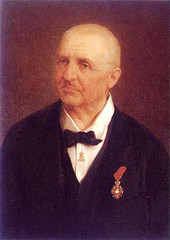|
Back
Longing for Divinity New York
Isaac Stern Auditorium, Carnegie Hall
03/05/2023 -
Anton Bruckner: Symphony No. 8 in C minor (Robert Haas Edition)
Vienna Philharmonic Orchestra, Christian Thielemann (Conductor)

A. Bruckner
“Hallelujah. It is done.”
Anton Bruckner’s words, reportedly as he finished writing last page of Eighth Symphony
“Thank God. It’s finished.”
Anonymous, reportedly at the end of the Eighth Symphony
At the risk–no, the certainty–of being labeled an utter Philistine, I was quite happy to escape the shouts of “Hurrah! Encore!” after the final notes of Bruckner’s Eighth Symphony this afternoon in Carnegie Hall. And escape to the great outdoors of Sunday in Manhattan.
Not that conductor Christian Thielemann gave a bad reading. But this hour‑plus‑plus work needs an extraordinary conductor to make it work. Perhaps years from now, that will happen.
The letdown was hardly due to the duration element. Mahler’s Third Symphony is almost as long. Schubert’s ‘Great’ C Major is of “heavenly length.” Though with those works, one has the feeling that each note is inevitable, that the omission of a single measure would send the whole edifice into a cloud of quartet‑note rubble. That is hardly true with Bruckner’s (perhaps ethereal) inspiration.
True, with the Vienna Philharmonic and conductor Thielemann, the Bruckner enjoyed a rare clarity. So clear that the repetitions of the first and second movements seemed extraneous, even irrelevant.
Stravinsky once criticised a composer for repeating his major themes over and over again. “If the tune is so good, one hearing should be sufficient”, he was quoted.
A silly bon mot, but in Bruckner’s case, somewhat apposite.
“Somewhat” because the Eighth has moments of the sheerest grandeur. The dissonances of the first movement along with those Cossack rhythms are the verisimilitude of an inferno. The slow movement is possibly Bruckner’s apotheosis of his religious quiet solemnity.
Merging all those themes of the movements together in the finale can produce an emotion like looking at the ceiling of St. Peter’s in Rome. (Of course Mozart did the same in the 41st Symphony without all the fanfares.)
What does this midget scribe feel went awry here? Perhaps Christian Thielemann in his personal ambition to be part of the pantheon of German Conductors (Furtwängler, von Karajan and the rest) was too careful this afternoon. The victory of the Eighth doesn’t lie in the repetitions, but in the whole structure. His Vienna Phil has the blazing brass, its timpanist (one Anton Mittermayr) created a fierce jungle of sounds, and the burnished strings were heavenly.
Still, it seemed that Mr. Thielemann was more aware of their greatness as consorts, that he telegraphed the great climaxes before they occurred. The Eighth doesn’t necessarily have to summon up a divine revelation with every measure. But, even after many hearings, one needs that sense of amazement in its totality.
This was a neat, comfortable performance. In fact over its 85‑odd minutes, Mr. Thielemann pressed the right buttons, gave us spirituality in the Adagio and resplendence in the finale concatenation.
Yet Bruckner is so spiritual, so hallowed, so naturally blessed from God with inspiration, one needs more than a beautifully-honed symphony. One needs the approximation, no matter how distant, of soaring88 minutes into the timeless endless Cosmos.
Harry Rolnick
|